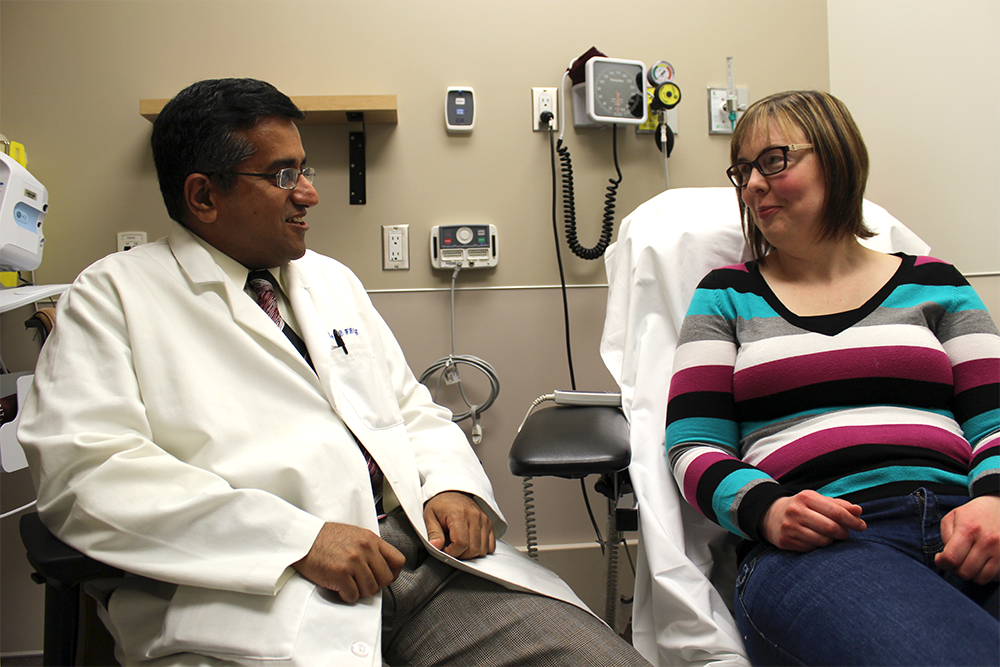Oct. 22, 2015
First autonomic nervous system disorder clinic opens in Calgary

From left, Dr. Satish Raj and Nicole Reeves, a patient with postural tachycardia syndrome.
Colin Zak, Alberta Health Services
Imagine waking up every day feeling light-headed, nauseous, and the idea of just getting out of bed is too difficult to bear. These symptoms became the norm for Nicole Reeves, a patient who suffers from a debilitating heart condition called postural tachycardia syndrome — commonly known as POTS.
But the new Calgary Autonomic Investigation and Management Clinic at the South Health Campus, which officially launches in November, will help give Reeves — and the thousands of POTS patients in Alberta like her — the treatment she needs.
“It’s important to have a clinic like this,” says Reeves. “Having a clinic such as this one in our backyard will have a dramatic effect on so many lives and I think this will really help a lot of people and their quality of life.”
For years, POTS patients have been seeking proper resources to assist with their condition. Now, specialists from the Libin Cardiovascular Institute of Alberta, an institute of both Alberta Health Services and the University Of Calgary, are able to help.
The Calgary Autonomic Investigation and Management Clinic, led by Dr. Satish Raj, an Alberta Health Services electrophysiologist and POTS specialist, began seeing patients a year ago. It is the first clinic in western Canada specifically geared towards assisting POTS patients.
Patients often misdiagnosed
POTS is a form of dysautonomia — an umbrella term used to describe several different medical conditions that cause a malfunction of areas in the autonomic nervous system. It is not a disease; rather, a condition that includes a number of underlying illnesses that can result in an increase in heart rate and decrease in blood pressure. This in turn causes symptoms such as gut irritation, joint problems, dizziness, and fatigue.
“One of the challenges for these patients is access to care,” says Raj, a member of the Libin Institute and an associate professor in cardiac sciences at the Cumming School of Medicine.
“With our staff and resources, we will have the ability to perform high quality testing, recognize both the common and less common syndromes, and deliver care in the way that reflects the best evidence that is currently out there," he says.
With rare visible signs of illness, many patients are overseen and misdiagnosed with having other conditions such as anxiety.
Symptoms can hinder daily activities and affect simple tasks
“Most patients are young females from their teens to 30s, whose POTS symptoms are affecting their daily activities such as going to school, working or caring for a family,” says Raj. “What this clinic provides is a referral home so when patients’ physicians contact us, we can provide proper advice and education to assist these individuals.”
POTS symptoms are often triggered when patients stand up, resulting in daily activities being quite challenging and often debilitating.
Jennifer Blagden has been so badly effected by POTS that it has put a hold on her career.
“It impacts every part of my life and the worst part is I have not been able to work as an orthopedic registered nurse as being on my feet would trigger my symptoms and make it very difficult to function,” says Blagden. “Simple tasks such as maintaining my home, groceries, and being with family proves to be challenging and results in a lot of frustration.”
Patients are referred to the clinic by their family physician or specialist. The clinic will include a research program that will complete studies involving POTS and other dysautonomia conditions such as vasovagal syncope and orthostatic hypotension. Research trials will be located at the South Health Campus and the university's Foothills Campus.
Clinic provides dietary and teaching resources, exercise training and tilt tests
Some initiatives offered at the clinic include creating dietary and exercise teaching materials; completing formal orthostatic vital signs; developing a supervised exercise training program for POTS patients, in partnership with Total Cardiology cardiac rehabilitation program; autonomic function testing and table tilt-testing (which will commence in the next couple of weeks).
To date, more than 50 patients have been treated at the clinic. Patients from other parts of the country such as Victoria, Saskatchewan, and Vancouver have also expressed interest in being referred to the clinic as well.
